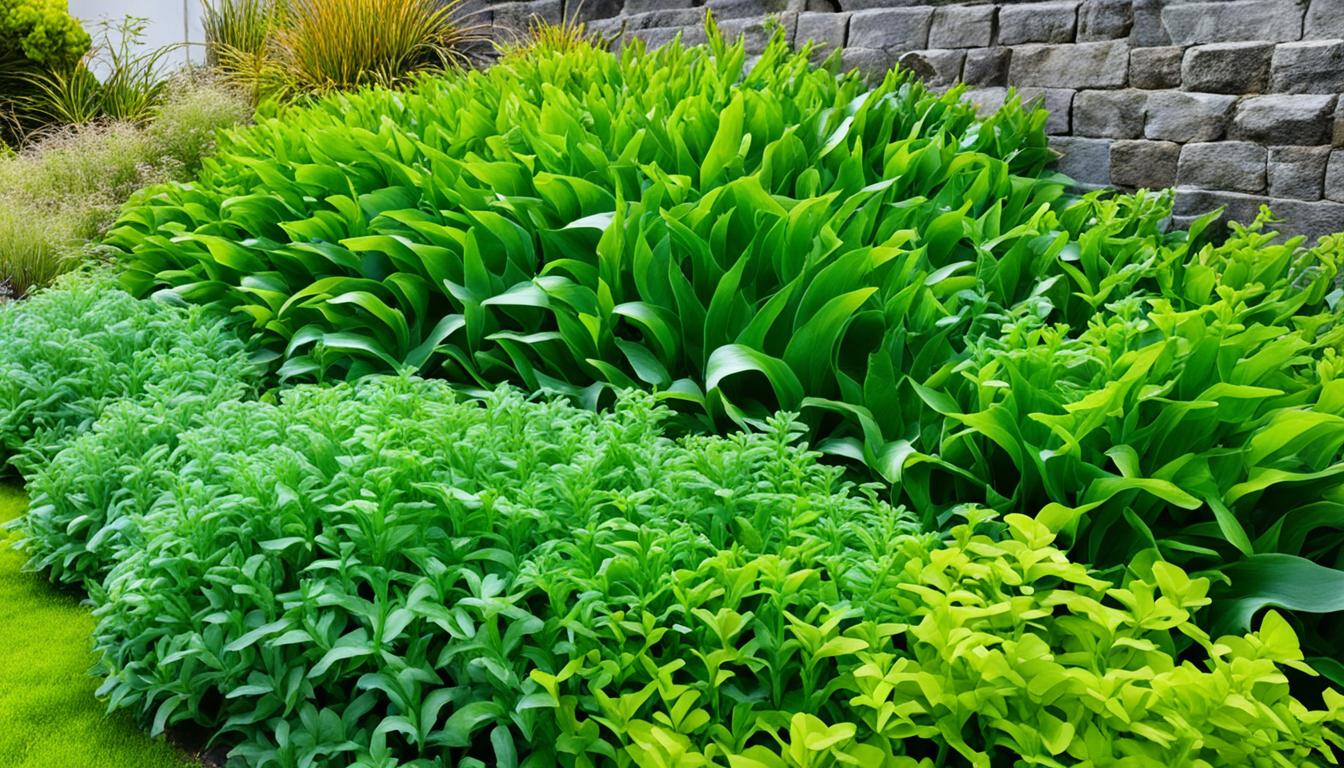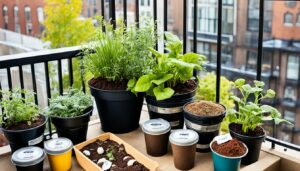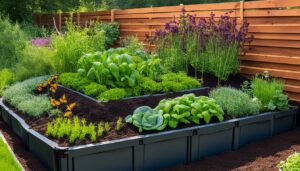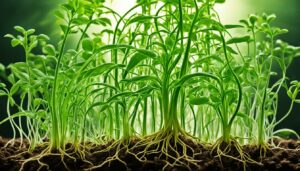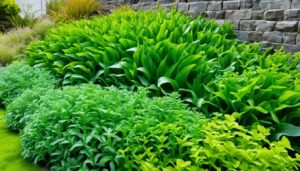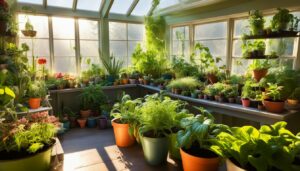Did you know kelp can grow 18 inches a day? This highlights its amazing ability to boost growth in gardens. Kelp is seen as a superfood for plants. It is rich in nutrients and helps plants grow stronger. When you add kelp to soil, it boosts roots, makes plants healthier, and helps them deal with stress. Plus, it’s good for the environment.
Kelp is not just about making plants grow better. It also makes the soil healthier and is a green option. It has been valued for ages, and now, using kelp helps plants reach their full potential while caring for nature. Let’s see how kelp can change how you garden!
Key Takeaways
- Kelp promotes robust root development and plant growth.
- It enhances plant immunity and increases stress tolerance.
- Improves soil health and contributes to sustainable agriculture.
- Acts as a multipurpose agent for overall garden health.
- Rooted in tradition, kelp usage in gardening continues to evolve.
What is Kelp and Why is it Beneficial for Gardens?
Kelp is a type of seaweed from the ocean. It’s known for its great nutrition and boosts plants’ growth naturally. This is why many gardeners use kelp to make their gardens healthier and more productive.
Introduction to Kelp
Kelp isn’t your average seaweed. It’s full of nutrients and hormones that are great for garden soil. Kelp soil amendment benefits range from making plants grow faster to making the soil more fertile.
Nutrient Density and Growth Hormones
Gardeners love kelp because it’s so nutritious. It has lots of micronutrients and plant hormones like cytokinins. These are key for plant growth and help them stay healthy and strong.
Historical Use and Modern Relevance
Coastal people have long used kelp for better soil and bigger plants. Now, it’s a top organic garden fertilizer. And harvesting kelp helps fight climate change too, by using up carbon dioxide. Kelp is still very important for gardeners today, showing its benefits are timeless and good for the planet.
Kelp Benefits in the Garden: Enhanced Root Growth and Immunity
Kelp is well-known for its help in gardening. It promotes strong root growth and boosts plant immunity. Adding kelp to your garden routine makes plants healthier and stronger.
Stimulating Root Development
Kelp is great at making roots grow. Solid roots are key for taking in nutrients and water. Seaweed extract, found in kelp, is very beneficial for a plant. It helps roots grow strong and deep. This means more access to soil nutrients and water. It also prevents soil from washing away.
Improving Plant Immunity and Stress Tolerance
Kelp doesn’t just help roots; it also makes plants more immune. It has hormones that make plants handle stress better. By using garden seaweed fertilizer, plants get stronger against bad weather and bugs. This makes your garden do well even when things get tough.
Organic Garden Fertilizer Benefits of Using Kelp
Adding kelp to your garden can do wonders. It boosts growth and keeps plants healthy. Kelp is full of key minerals and hormones that plants need. This makes it a great choice for gardens.
Nutritional Advantages
Kelp brings many benefits to plants. It helps make your fruits sweeter, your veggies bigger, and your flowers more abundant. This is because it has essential minerals and growth hormones like cytokinins. They support strong plant growth.
Moreover, using kelp improves the soil. It helps plants take in nutrients better. This speeds up their growth.
Stress and Pest Tolerance
Kelp also helps plants deal with stress. It improves their ability to survive droughts and changes in temperature. Plus, it has defenses that lower pest damage. This means you need fewer pesticides. So, your garden stays healthier.
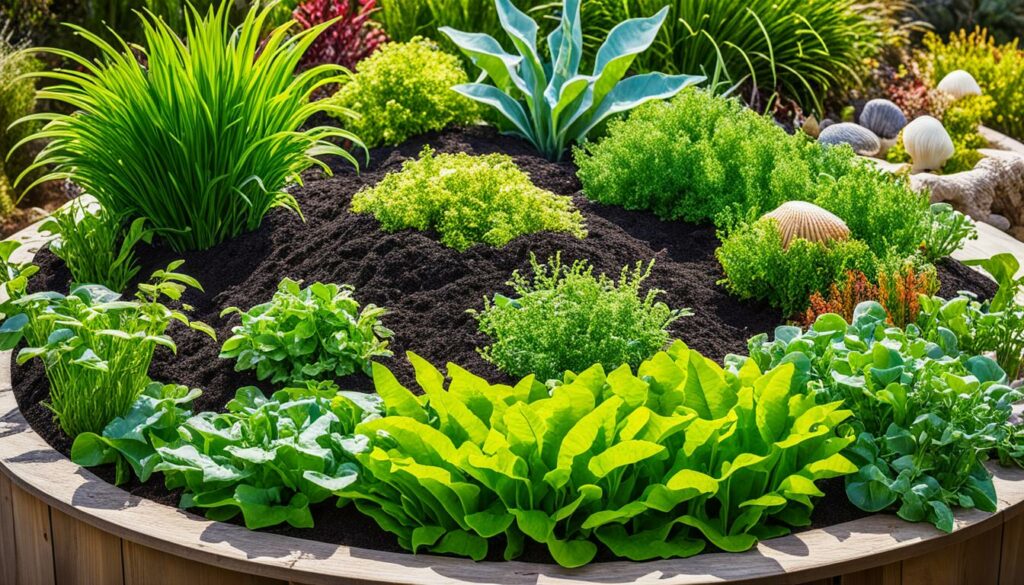
Eco-Friendly Aspects of Kelp Fertilizers
Using kelp fertilizer in gardens brings many green benefits, key for farming in years to come. Kelp grows fast with few needs, so it’s great for the earth and keeps coming back.

Sustainability of Kelp
Kelp is easily grown in ways that don’t take up much space or water. Therefore, it’s an ideal choice for farming that thinks about the future. Its growth helps the sea life around it to thrive, making it part of a healthy cycle.
Environmental Benefits and Climate Change
Kelp helps fight climate change by absorbing a lot of carbon dioxide. This lowers harmful gases in the air. Also, farming kelp in the sea is good for many animals and plants that live in the water.
Conclusion
Kelp is now a must-have for modern gardens. It offers many benefits. These go beyond just making plants healthy. Kelp helps plants grow better, builds roots stronger, and fights off stress and pests. This all makes kelp an amazing pick for gardeners wanting better gardens.
Seaweed fertilizer, including kelp, is good for our planet. It helps gardens be more eco-friendly. Kelp boosts the soil, making gardens healthier. So, when you use kelp in your garden, you’re not just helping your plants. You’re also helping the environment.
Using kelp means you’re helping the earth. It’s a smart way to grow plants and fight climate change. So, give kelp a try. See a garden that not only thrives but also helps the planet.

